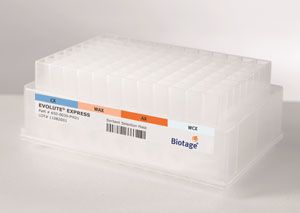EVOLUTE® EXPRESS
EVOLUTE? EXPRESS, is a novel family of 96-well plates that simplify polymer-based SPE by employing a streamlined 3-step protocol; Load-Wash-Elute. By using this novel approach and removing the conditioning and equilibration steps, necessary with traditional bio-analytical SPE procedures, processing and method development times are dramatically reduced without loss of analyte recovery or method robustness.

EVOLUTE® EXPRESS, is a novel family of 96-well plates that simplify polymer-based SPE by employing a streamlined 3-step protocol; Load-Wash-Elute. By using this novel approach and removing the conditioning and equilibration steps, necessary with traditional bio-analytical SPE procedures, processing and method development times are dramatically reduced without loss of analyte recovery or method robustness.
The EVOLUTE® EXPRESS design provides a uniform flow in the processing of aqueous samples and eliminates the need to re-run samples due to well-clogging. This clear flow technology makes EVOLUTE® EXPRESS particularly efficient and effective when used with SPE automated systems whilst adding a distinct advantage by allowing consistent, rapid and reliable manual processing of the plates.
Biotage has built a reputation for offering products that simplify Sample Preparation, promoting high throughput and reliability. This new product addresses a real concern for many analysts who have to re-run samples due to well-clogging and sample variability. The minimal 3-step approach of Load-Wash-Elute will considerably improve the way SPE is performed and offer significant time savings for all bio-analysis labs.
EVOLUTE® EXPRESS 96-well plates are packed with polymer-based EVOLUTE® chemistries (ABN, CX, WCX, AX and WAX) to address most application needs, and a new sorbent selection plate for screening and method development has been added.
Contact Details: Biotage AB, Box 8 SE-751 03 Uppsala Sweden
Phone: +46 18 56 59 00
marcom@biotage.comwww.biotage.com
Pittcon 2025: Xiao Su Discusses His Work in Electrochemical Separations
March 13th 2025In this video interview with Xiao Su, he dives deeper into the research that he and his team are conducting with redox-active polymers and the applicability of electrochemical approaches in separation science.
The Next Frontier for Mass Spectrometry: Maximizing Ion Utilization
January 20th 2025In this podcast, Daniel DeBord, CTO of MOBILion Systems, describes a new high resolution mass spectrometry approach that promises to increase speed and sensitivity in omics applications. MOBILion recently introduced the PAMAF mode of operation, which stands for parallel accumulation with mobility aligned fragmentation. It substantially increases the fraction of ions used for mass spectrometry analysis by replacing the functionality of the quadrupole with high resolution ion mobility. Listen to learn more about this exciting new development.
Pittcon 2025: Kate Perrault Uptmor Talks About Multidimensional GC and Mentorship
March 13th 2025In our interview with Kate Perrault Uptmor, we asked her about the resources available for those interested in learning more about multidimensional chromatography, and current trends happening in separation science that are of particular note.
Analyzing Effects of Adverse Cardiovascular Events on Chronic Kidney Disease with HPLC
March 13th 2025Researchers investigated the potential association between plasma apolipoprotein M (APOM) levels and the risk of adverse cardiovascular outcomes in individuals with chronic kidney disease (CKD). Plasma sphingosine-1-phosphate (S1P) levels were measured by high performance liquid chromatography (HPLC).










